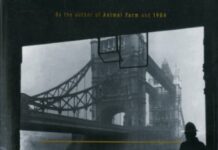
Ebook Info
- Published: 2022
- Number of pages: 319 pages
- Format: EPUB
- File Size: 2.06 MB
- Authors: George Orwell
Description
A Clergyman’s Daughter is written by George Orwell.
User’s Reviews
Reviews from Amazon users which were colected at the time this book was published on the website:
⭐”A Clergyman’s Daughter” is probably the least-known of all Orwell’s novels; certainly it is the most difficult to find. And if I had to rank it, I should probably put it near the bottom of his book-length literary achievements. It isn’t as evocative as “Burmese Days”; as haunting as “1984”; as scathing as “Keep the Aspidistra Flying”; or as darkly poignant as “Coming Up For Air.” Put another way, it lacks the resonance of Orwell at his best. But I hasten to add that Orwell at 70% is still better than most novelists firing on all cylinders could ever dream of being. And it has the advantage of examining an aspect of pre-WW2 English life which he often wrote of in essays but only once explored in fiction: genteel English poverty.Dorothy Hare is the stressed-out, overworked, put-upon, taken-for-granted, sexually frigid daughter of an arrogant and irresponsible rural minister. So pious she jabs herself with needles when she thinks unworthy thoughts, so hard-working she is often delirious with lack of sleep and physical exhaustion, Dorothy works mightily, but in the end futilely, to support a falling-apart church with a dwindling congregation. Though the granddaughter of a baronet, she is as penniless as a churchmouse and in a perpetual state of agony over lack of money. To make things worse, her father, the Rector, is not only uninterested in his own money-woes, creating even more stress for Dorothy, he clings to the fantasy that he is still a well-heeled young Oxford man, with crowns jingling in his pocket and blue blood pumping through his veins. Indeed, it is his status as a clergyman and the nephew of a peer that sustain him even while his church falls down around his ears, his creditors bang at the door, and his daughter trembles on the verge of an emotional breakdown. And in fact Dorothy does have a breakdown, waking up one morning in London with no money and memory of who she is or how she came to be there. Falling in with some tramps, she spends weeks picking hops in rural England as an amnesiac before she finally regains her identity, and discovers to her horror that while she remembers exactly who she is, she longer retains any of her religious beliefs. Unable to return home because a scandal-monger in town has spread lies about her running off to Paris with an older man, she eventually finds work as a teacher in a wretched girls’ school right out of Dickens, and tries to find meaning in an absolutely meaningless job. If she can just inspire these listless underfed wretches of pupils, perhaps she will have found a substitute for her faith in God…”A Clergyman’s Daughter” is typical Orwell in that the subject of money – or rather, lack of money – is central to the story, as is the issue of social class and the oddly horrible trap it sets for those who are expected to keep up appearances regardless of their actual income. It is also an examination of the need for faith, or at least a belief-system, in life, and an effective attack on the open fraud that was the educational system in Britain during this time. And in a sense the individual strengths of the book are also its weaknesses. Everything Orwell examines – the Rector’s stylized denial of reality, the school headmistresses ruthless, cynical, totally unprincipled attitude towards education, the bare horror of poverty in pre-Socialist England, the lingering and often terrible effect of Victorian-era morals in an industrial society – he tackles well. Indeed, the hop-picking sequences are so vividly and beautifully written that you lose yourself completely within them, as you do in the gloom of the awful Dickensian swindle of a “school.” (Orwell is a hugely underrated prose-writer). However, the very breadth of the book’s scope works somewhat against it, obscuring what is supposedly the central issue – Dorothy’s loss of faith. Orwell handles Dorothy’s change from a pious believer to an apostate almost without transition; one moment she’s a fanatic and the next she’s half-lamenting her inability to pray, and in any case she’s too busy trying to survive in a cold and indifferent London to give the matter too much thought `til the very end. The scattershot way in which things are handled gives this book its flavor, but also makes the flavor a bit muddled. There are times, late in the book, when it has the feeling not of a novel, but of muckracking journalism.Having said that, I would still recommend this novel to Orwell fans, to anyone interested in English society during the sluggish and painful transition out of “mental Victorianism.” Also to those who find, as I so often do, that Orwell had an almost freakish talent for writing pieces which on the surface seem to belong entirely to the era in which they are written, but somehow never become dated, and in some ways grow more rather than less relevant with the passage of time.
⭐Most of us are familiar with Animal Farm and 1984; this story of a clergyman’s daughter living in 1930’s England is far more grim and depressing than any of Orwell’s totalitarian dystopias. Orwell the freethinker sees the Christian life as nothing but unrelieved hypocrisy, cant, and flummery, a way of making you feel like you are a good person as long as you are making yourself miserable. Perhaps the Anglican Church in prewar England was indeed a discouraging spectacle; certainly the manners and mores of most English people in that period seem to have been less than life-embracing. The characters in this novel are mostly shabby and small; even the better ones are hardly heroic, but I cannot believe that the English were ever such an utterly mean and joyless people as Orwell makes them out to be, and in his scant regard for the established church he misses the spirit of true Christianity. In some ways this was an informative description of English society, but it was not a good story.
⭐My second non-big-two (Animal Farm and 1984) Orwell novel, and I enjoyed it every bit as much as the first (Burmese Days). Daughter follows the early life of Dorothy, who is the daughter of the Rector of Knype Hill, a small town in England. The Rector is, by far, the most destructive character in the book–a detail not lost on me. He’s selfish, ignorant, and lazy–all of which characteristics combine and contribute to Dorothy’s troubles.Poor Dorothy begins essentially as the Rector’s unpaid curate, except that her responsibilities are likely wider–she fends off her Father’s creditors, attends to parishioners, cooks meals, cleans house, and earns money for the church. She is Prince to her father’s Turveydrop (Bleak House, 1853).Dicken’s tale is just one of many literary precedents that come to mind: Sister Carrie (1900), in the depiction of a rapid decline into homelessness; Nicholas Nickleby (1839), in the depiction of horrifying private schools; The Barchester books of Anthony Trollope (1855 – 1867), in the depiction of a flawed clergy; Oliver Twist (1838), in the story of a person cast out penniless on the world and finding herself among an element she had not before imagined.When the book departs from Trollope mode, you realize that Daughter will be no routine work of fiction and that the author has his own agenda. That agenda has in part to do with the role of religion in life. Dorothy loses her faith, not as an act of will, but rather passively–she realizes one day that all she was taught to believe is fiction. In the end her loss of faith doesn’t change her conduct; rather, her fundamental character guides her. Another theme has to do with the benefits of purposeful work; work for its own sake and not part of an imagined universal plan.The themes of the book are as relevant today as the were when the books was written. Fast reading. Much to think about.
⭐Very enjoyable, darkly comic and ultimately fatalistic social commentary, as well as the story of a conflicted woman suffering a break from reality as she loses her Christian faith. Outwardly upright Christian woman in small and small-minded English town suddenly loses memory, ends up in misadventures with low-class and homeless people before regaining her memory. Subsequently finds herself in a possibly worse situation in a scandalously bad, sham, miserable private school in lower-class suburban outskirts of London. Exposes paltry conditions in English countryside for the poor, hop farm conditions, small town English provincialism, London street life and awful educational system. Like other Orwell works, shows the seamy and miserable side of life, especially poverty and its effects. Resigned to the idea that the best way to get through life is to stay busy and occupied – just work, don’t think – whether you have faith or not. Faith in God is irrelevant.
⭐Orwell himself didn’t think much of the novel, describing it as “a silly potboiler” that he regretted having written. I have to disagree. It’s a quietly powerful account of an overwrought life disintegrating and being rebuilt. The section with the voices in Trafalgar Square (the start of chapter three, at the midpoint of the book) is brilliantly carried off, and is an inspired way to show the complete alienness of the world Dorothy now finds herself in. The writing is, naturally, superb and the humanity and empathy of the author shine through in exactly the way that Dorothy feels she ought to, but fails to, discern the presence of her God.
⭐Apparently Orwell himself disliked this book (artists often want to destroy previous work and are their own harshest critics). A couple of parts don’t quite work for me (the Trqfalgar square conversations), but Orwell at his gloomy best when outlining gruelling poverty and some of the characters he comes across in English life and the class system. Also, the writing shows his sympathetic and sensitive attitude to his female protagonist’s dilemmas and limited life choices, and her loss of faith.
⭐Despite its bad press (even Orwell himself didn’t like it), ‘A Clergyman’s Daughter’ is well worth a read.If it was by a lesser author it would probably have a much stronger reputation than it does. As it is, yes it definitely is the weakest of his novels, but as an evocative panorama of life below-the-breadline in depression-era England it is fantastic. A lot of the scenarios (hop-picking in Kent; homeless in Trafalgar Square) will be familiar to anyone who’s read Orwell’s diaries or some of his essays, but alongside the unforgettable school-teaching scenes and the brilliant descriptions of life in a small, petty, curtain-twitching village, the book as whole is as good as any account I’ve read of what it was like to be on the fringes of society and struggling for money in the early ’30s.The general criticisms of the novel are all entirely valid. Dorothy’s amnesia is never properly explained; the hop-picking scenes are too descriptive and close to Orwell’s reportage diaries of his time doing this; and the ‘experimental’ scenes around Trafalgar Square get rather annoying and skippable after the first couple of pages; BUT, if you go into the novel, as I did, prepared for these things, then they really don’t matter, and didn’t mar my enjoyment of it as a whole. What was good was VERY good, enough so to make up for the weaknesses. In particular I think the chapter of the book in which Dorothy becomes a school-teacher ranks up there with anything Orwell wrote, especially in his characterisation of the detestable Mrs Creevy and the way he describes the gradual disintegration of Dorothy’s initial enthusiasm and promise.I tend to be very nostalgic and sentimental about inter-war England (the beautiful monochrome photos of Bill Brandt, the booze-soaked melancholy of Patrick Hamilton….), but novels like this one, alongside ‘Keep the Aspidistra Flying’ and ‘Coming Up For Air’, are reminders of just how grim life was for probably the vast majority of people at this time. I would actually recommend considering these three novels as a sort of Orwellian ’30s triptych, and think that read in order of publication (Daughter; Aspidistra; Air) they will each work best both as novels and as unforgettable historical documents. The looming threat of the Second World War is almost pysically tangible as they go on, a shadow crossing the landscape of these books, getting darker and heavier right the way through…So don’t be wary about trying this one. I was put off for ages because of its reputation, but am glad I eventually took the plunge. If you’re interested in Orwell, or in the ’30s generally, it is a must-read.
⭐The ‘Note on the Text’ for this edition tells us that Orwell regarded his second novel as a ‘silly potboiler’, but goes on to remind us he was similarly disparaging in describing Animal Farm as ‘a little squib’. Clearly like most great writers, Orwell was one of his harshest critics. Without doubt A Clergyman’s Daughter is not Orwell at his very best and the rather simplistic plot and over-romanticised resolution are no match for his later masterworks. But then again, this was only his second novel, so what we get is something of the artist learning his craft. And there are some classic Orwell themes here to be savoured, such as the oppression of the middle-classes, the struggle for individuality, the thorny issue of money and how liberating or crushingly confining an individual’s access to it can be, and of course, the brilliantly vivid descriptions of real poverty and grubby privation.You might gain most from A Clerygman’s Daughter if you have read his more celebrated works first. In that case, it may just appease your appetite for more from one of England’s very finest novelists. It’s not his best work, but it’s still Orwell.
⭐First chapter reads like a kitchen sink drama, our heroine leading a staid existence as a put upon clergyman’s daughter. 2nd chapter she is waking up with amnesia, and we have no idea how she got here. 3rd chapter, after living a hard life as a hop-picker in Kent and slowly recovering her memory, seems she cannot get back home and is living with other homeless people in London. The 3rd chapter is all in speech, everybody talking over everybody else,lost in their own miseries. This is quite an intriguing read, each chapter being totally different.
Keywords
Free Download A Clergyman’s Daughter in EPUB format
A Clergyman’s Daughter EPUB Free Download
Download A Clergyman’s Daughter 2022 EPUB Free
A Clergyman’s Daughter 2022 EPUB Free Download
Download A Clergyman’s Daughter EPUB
Free Download Ebook A Clergyman’s Daughter




